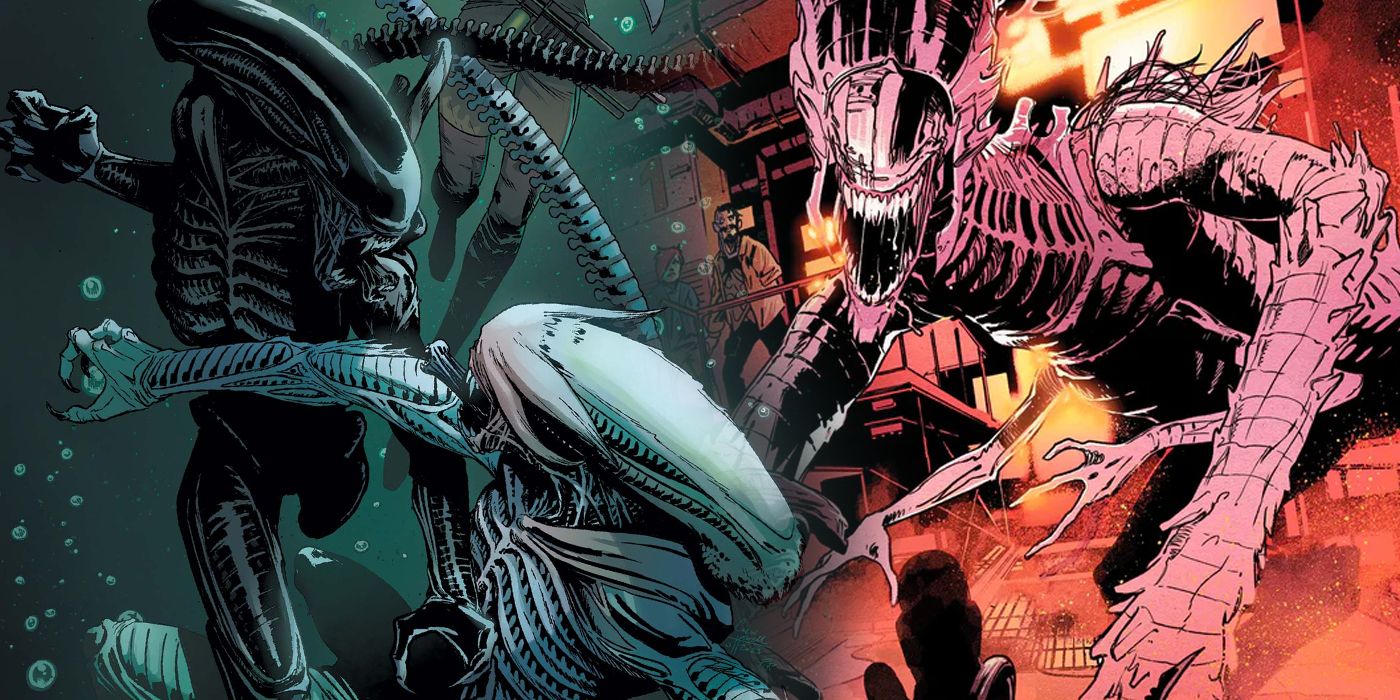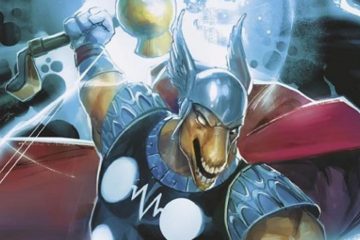1979’s Alien introduced audiences to an entirely new breed of sci-fi horror. Unsurprisingly, the film was only the first of many to come over the years, with the franchise currently standing at a whopping nine films, including multiple crossovers with the similarly iconic Predator franchise. This is to say nothing of the various novels, comics, and upcoming productions set in the Alien universe. Along the way, there have been numerous attempts to add exciting and memorable new layers to the franchise’s mythos, though not all of them have made any real impact, and the latest Marvel epic is just the last to fall victim to the very same fate.Alien #4 (by Declan Shalvey, Andrea Broccardo, Ruth Redmond, Jay Bowen, and VC’s Clayton Cowles) brings readers to the icy, barren landscape of Cocito, a small ice moon now inhabited by two distinct breeds of Xenomorph. Within what little remains of the research base known as The Keg, Cocito’s only humans are caught in a battle of life and death. Zasha, whose life has been largely defined by the threat posed by Xenomorphs and the horrors they leave in their wake, is left facing off against the egotistical and sadistic Jun Yutani. While Zasha came to Cocito hoping to rescue the remnants of her synth companion Dayton out of a profound sense of duty, Jun made the trip to harvest Dayton’s knowledge and anything else of value in the name of raw profits. Of course, things aren’t quite that simple, and by the time the dust has settled, it is clear that almost everyone involved was misled in one way or another. Still, there is a sense of catharsis in the tragic yet heartfelt loss of Zasha and Dayton, one completely undercut by how little their story is bound to matter in the wider scope of the Alien franchise.1992’s Alien 3 famously alienated fans and cast members alike by killing off some of the most beloved characters the franchise had created. 1997’s Alien Resurrection took things even further by bringing Sigourney Weaver’s Ellen Ripley back as a clone of her former self spliced with Xenomorph DNA. Rather than returning to the same setting, the franchise then made the leap into crossover territory and prequel territory with 2004’s Alien vs. Predator and 2012’s Prometheus, respectively. While the former was an overtly action-oriented popcorn flick, the latter dove into an attempt at elevated storytelling with long-lost alien races and unfathomable ancient technology. Though both films were successful enough to garner sequels, they both suffered from the same pitfalls as Alien 3 and Resurrection, specifically that the major changes they attempted to make fell far short of what audiences were hoping for.
1979’s Alien introduced audiences to an entirely new breed of sci-fi horror. Unsurprisingly, the film was only the first of many to come over the years, with the franchise currently standing at a whopping nine films, including multiple crossovers with the similarly iconic Predator franchise. This is to say nothing of the various novels, comics, and upcoming productions set in the Alien universe. Along the way, there have been numerous attempts to add exciting and memorable new layers to the franchise’s mythos, though not all of them have made any real impact, and the latest Marvel epic is just the last to fall victim to the very same fate.
Alien #4 (by Declan Shalvey, Andrea Broccardo, Ruth Redmond, Jay Bowen, and VC’s Clayton Cowles) brings readers to the icy, barren landscape of Cocito, a small ice moon now inhabited by two distinct breeds of Xenomorph. Within what little remains of the research base known as The Keg, Cocito’s only humans are caught in a battle of life and death. Zasha, whose life has been largely defined by the threat posed by Xenomorphs and the horrors they leave in their wake, is left facing off against the egotistical and sadistic Jun Yutani. While Zasha came to Cocito hoping to rescue the remnants of her synth companion Dayton out of a profound sense of duty, Jun made the trip to harvest Dayton’s knowledge and anything else of value in the name of raw profits. Of course, things aren’t quite that simple, and by the time the dust has settled, it is clear that almost everyone involved was misled in one way or another. Still, there is a sense of catharsis in the tragic yet heartfelt loss of Zasha and Dayton, one completely undercut by how little their story is bound to matter in the wider scope of the Alien franchise.
1992’s Alien 3 famously alienated fans and cast members alike by killing off some of the most beloved characters the franchise had created. 1997’s Alien Resurrection took things even further by bringing Sigourney Weaver’s Ellen Ripley back as a clone of her former self spliced with Xenomorph DNA. Rather than returning to the same setting, the franchise then made the leap into crossover territory and prequel territory with 2004’s Alien vs. Predator and 2012’s Prometheus, respectively. While the former was an overtly action-oriented popcorn flick, the latter dove into an attempt at elevated storytelling with long-lost alien races and unfathomable ancient technology. Though both films were successful enough to garner sequels, they both suffered from the same pitfalls as Alien 3 and Resurrection, specifically that the major changes they attempted to make fell far short of what audiences were hoping for.
#Marvel #Comics #Alien #Epic #Finally #Matter
Note:- (Not all news on the site expresses the point of view of the site, but we transmit this news automatically and translate it through programmatic technology on the site and not from a human editor. The content is auto-generated from a syndicated feed.))



